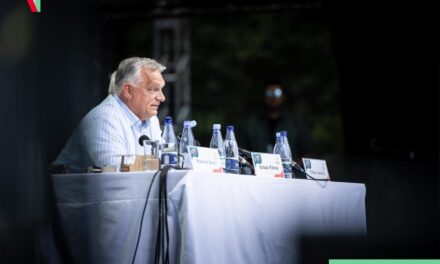Anna Donáth is proud of her grandfather, who was Rákosi's head of the secretariat, but she did not reveal all the details of the truth about her ancestry. The memory of the millions of victims demands clear, straightforward speech and uncompromising action against today's followers and "useful idiots" of the two total dictatorships.
Anna Donáth, Momentum's president and EP representative, recently spoke about her grandfather, Ferenc Donáth, in an interview with nyugat.hu. On the Látószög Blog, historian Rajmund Fekete drew attention to the contradictions of the conversation, as well as to the double standard in judging communist and national socialist ideas.
On March 8, Anna Donáth, the president of Momentum and an EP representative, gave an interview to nyugat.hu - the article of historian Rajmund Fekete can be read on the Látószög Blog.
The blog entry recalls that the reporter conducting the interview begins the conversation by saying: "if there is a family that is quite famous or famous in politics in Hungary", then the Donáth family definitely belongs there.
According to this post, Anna Donáth tells family stories, and at one point she begins to outline the past of her grandfather Ferenc Donáth "with pride and shining eyes".
"He was a politician and a lawyer-lawyer from Jászberény, who was also present at the founding of the illegal communist party. Despite his Jewish origin, he was hidden in World War II not because he was saved from the Holocaust, but because of his illegal communist movement. So he got involved in public life and politics very early on, and obviously a lot happened to him over the years and his thinking took shape, until he reached reform communism and the Imre Nagy company," Látószög quoted Anna Donáth as saying .
According to Látószőg
Anna Donáth - similar to Ferenc Gyurcsány's famous saying in 2006 - did not lie, but she did not disclose "every detail of the truth."
Márton Békés, the XXI. The director of the Század Institute previously wrote an excellent paper entitled Apró–Donáth Family: Parallel Biography, which presents the life path of Ferenc Donáth. Unfortunately, it is not clear from the above interview that Donáth held key positions as a staunch communist not only during the period of illegality, but also from 1945 onwards. As a result of the November 1945 election, he sat in the Communist faction of the National Assembly and became the State Secretary of the Ministry of Agriculture, as well as the head of the party's Village Department. In 1948, he resigned from the title of State Secretary to become the head of the General Secretariat Office of the MKP Central Leadership (KV). Donáth therefore became Mátyás Rákosi's head of the secretariat - Látószög continues.
The author then recalls Ferenc Donáth's 1967 recollection of what his task was.
"I took part in most of the leading bodies, this meant that [...] in those bodies in which Rákosi could not participate due to his busy schedule, I would appear instead and inform them about their more important decisions or about my personal impressions," Ferenc Donáth wrote in 1967. -in.
In this capacity, according to Békés, Anna Donáth's grandfather was Rákosi's eyes and ears from January 1948 until February 1951, and the party general secretary even counted on him as an "agrarian policy expert", at least according to Rezső Nyers' recollections.
According to the blog post, Anna Donáth "proudly states in the interview" that the land distribution in the 1950s is also linked to the name of her grandfather, Ferenc Donáth.
Just to clarify: Donáth already worked on the agricultural program of the KMP/Peace Party during 1943-1944, on the basis of which the draft agricultural program of the MKP was completed in the fall of 1946, which was made public under his name, with the recommendation of Rákosi (!). The XXI. According to the director of the Szazad Institute, in accordance with the temporarily valid communist tactics, it was stated that although the communist party "supports the cooperative movement of the peasantry", its priority is "the protection of the property of the working peasantry". A year after the land distribution that was taking place with Donáth's participation, collective farming would therefore not have been a popular idea. They waited until February 1949 to sovietize agriculture. At that time, Donáth gave a speech at the Political Academy of the MDP, where, referring to Lenin and Stalin, he ranked the "fight against the kulaks" first among the "conditions for the socialist transformation of agriculture". According to the statement, "we pushed the bourgeoisie, including the representatives of the village bourgeoisie, out of power [...] we implemented a whole series of regulations against the kulaks. We have already determined last year's supply by […] we used the bread grain of the kulaks to a much greater extent […] We broke down the resistance of the kulaks with harsh measures”. Donáth also had the honor of criticizing Imre Nagy's agricultural policy views at the KV meeting on September 3, 1949. The laying down of the correct party line on this issue was anyway entrusted to him following his lecture at a party school (Reading book for the study of Marxism-Leninism. II. 1949. The Peasant Policy of the Party). Between 1949 and 1951, Donáth was also a member of the dysfunctional collective head of state body, the Presidential Council of the Hungarian People's Republic, recalled the Látószög Blog.
The writing then continues as follows:
An internal party investigation was launched against Donáth, who headed the Rákosi Secretariat, at the end of 1950, he was arrested in February 1951, and at the end of 1952 he was sentenced to 15 years as a secondary defendant in the Kádár trial (together with his former illegal comrades: Sándor Haraszti and Gyula Kállai) on trumped-up charges, then released in 1954. he was dismissed, he was acquitted of all charges at the retrial hearing, he got his party membership back, and then a place was found for him as the deputy director of the Institute of Economics of the Hungarian Academy of Sciences. Donáth slowly joined the ranks of the "party opposition" grouped around Imre Nagy, after Nagy forgave him for his overzealousness in 1949. In the spring of 1956, he was the economic debate leader of the Petőfi Circle, and in June he participated in Imre Nagy's 60th birthday demonstration.
In October 1956, Donáth was elected vice-chairman of the People's Front committee. On the night of October 23-24, 1956, Ferenc Donáth was elected secretary of the MDP KV in his absence (which he did not accept anyway). During the 1956 revolution and freedom struggle, he worked in Imre Nagy's secretariat located in the Parliament. From October 31, he was a member of the Temporary Executive Committee of the Hungarian Socialist Workers' Party (MSZMP), which was created as a successor to the dissolved MDP. On November 4, after the Soviet tanks moved in, together with Imre Nagy and several other leaders, Ferenc Donáth also fled to the Yugoslav embassy. On November 22, he and his companions left the embassy with the promise of a free retreat, but were captured by the Soviet authorities and interned in Snagova, Romania. The captivity in Snagov lasted from the end of November 1956 to April 1957.
Ferenc Donáth was sentenced to 12 years on June 15, 1958, as a secondary defendant in the Imre Nagy trial, on the charge of participating in the organization aimed at overthrowing the popular democratic state order. Among the accused, first-rate Imré Nagy and third-rate Miklós Gimes were executed, as was fifth-rate Pál Maléter; the sixth-ranking Kopácsi received a life sentence, Imre Nagy's son-in-law, the seventh-ranking Ferenc Jánosi was sentenced to eight years, the eighth-ranking defendant, the former press chief of the Great Government, Miklós Vásárhelyi, received five years. Imré Nagy and his fellow martyrs were executed on June 16, 1958. Donáth Vácott was imprisoned together with Vásárhelyi, both were released in 1960, with individual pardons.
According to Békés, there is an assumption that Donáth and Vásárhelyi were members of the Soviet services - and that was the only reason they could survive. According to him, it is an interesting development that "both Donáth and Vásárhelyi really acted as opposition organizers in 1984: the former with the invention of the Monor meeting, the latter in connection with the establishment of the Soros Foundation."
According to Látószög, the nyugat.hu report "takes a surreal turn at one point, when the editor-in-chief begins to excuse Anna Donáth because the EP representative explains her grandfather's communist past "a little".
"We have such a thing that if we say the communist party or the illegal communist party, a negative adjective is immediately attached to it", even though "there was a period when the undertaking of this, or if someone is a member of this party was a very progressive, very important social commitment," he said in the interview.
The writing of Látószög then draws attention to the double standard still experienced in the evaluation of communist and national socialist ideas.
Although it has been more than three decades since we shook off the chains of dictatorship during our anti-communist revolutions, statements like these and similar ones are what justify the statement of Mária Schmidt, the director general of the House of Terror Museum: "communism is not dead." And not only is it not dead, it is still a legitimate idea. While Nazism was consigned to the dustbin of history in both moral, intellectual and moral terms, the debate about communist systems and the ideological nature of communism was not over, in fact! - writes Látószög.
According to the article, the reporter evaluates communism as a "progressive, very important social commitment" and Anna Donáth as an "anti-fascist stance", while one of the most destructive ideas of the twentieth century claimed at least 100 million lives worldwide.
The writing of the Perspective then continues as follows:
"Donáth's grandfather was the head of the secretariat of Mátyás Rákosi, whose name is still associated with the worst period of communist terror in Hungary.
Between 1945 and 1956, nearly 400 people were executed for political reasons, and official proceedings were initiated against almost every third adult, while 700,000 of our compatriots were dragged to forced labor camps.
The system taken under their protection - of which Ferenc Donáth was a key figure - was a total dictatorship from the first moment to the last. From the very beginning, he showed extremely repulsive traits that were completely opposite to his goals, that is, to his ideals. Instead of abundance, it created a lack of goods, instead of equality, it distributed double rations to party cadres and created a new ruling class, a new elite. Instead of fraternity, he implemented a system of suspicion and general whispering, and instead of freedom, he wove a spider's web of the most minute, the most absurd, the most humiliating compulsions, which he kept in fear with the tool of merciless terror. The system of communist terror was based on exclusivity and unification, which politicized all areas of life. The communists abolished private property and constantly experimented with the complete abolition of the private sector. People who were forbidden and weaned from responsible decisions were gathered into a mass party, forced into mass culture, and degraded into mass people. Their traditional ties were severed and their traditions abolished. In a society atomized in this way, there is no refuge left for individuals vulnerable to manipulation and made rootless," the blog post details, in which the author draws the final conclusion:
"The nyugat.hu interview fits perfectly into the trend that is again (or is it still?) trying to separate the Nazi and communist ideologies from each other: while one is smothered in the bud and condemned, the other is excused and its crimes downplayed.
With this, they also want to create the appearance that these two vile worldviews have nothing to do with each other - as if they had sprung up separately, followed separate paths and had different natures. But the opposite is true. Nazism and Communism went hand in hand and go hand in hand: they could count on and count on each other, they built on each other, they took ideas from each other, and if necessary, they teamed up without any problems when it came to the division of the world (Hitler-Stalin Pact, also known as the Molotov Pact Ribbentrop Pact). Let's remember that both are left-wing, socialist ideologies: national and international socialism.
The memory of the millions of victims demands clear, straightforward speech and uncompromising action against today's followers and "useful idiots" of the two total dictatorships.
So we must not put up with the fact that some people distinguish between executioner and executioner, murderer and murderer. We must not allow them to be exempted! That they deny their crimes, make excuses for them, and even try to explain it!" - concludes the post, in which our Nobel Prize-winning writer, Imré Kertész, is also quoted, who had this opinion about Nazism and Communism:
“One appears as a savior, and under his cloak lies the devil; the other is dressed as Satan, and he is”.
the Látószög Blog in its entirety here.
Source: hirado.hu
Photo: Facebook













